
Click the picture to download a PDF of this story.
By Hilary Welter, hwelter@nrha.org
My name is Hilary Welter, and I just finished living out of a suitcase for 12 months.
Over the past year, I had the opportunity to do some pretty amazing activities like riding a camel in Morocco, skydiving in Croatia and skiing in Switzerland. Throughout my travels, I also learned unique retail lessons and met impressive home improvement retailers across Europe.
It started in July 2016, when I boarded a plane to Lisbon, Portugal, to begin my one-year journey with a program called Remote Year.
Remote Year is a company that brings together groups of 50 to 80 professionals from industries like technology, marketing and retail to see the world during a year of professional and personal growth. I was selected to participate in the program’s sixth group of travelers. I spent one year living in and exploring a different city and country each month while working remotely full time for the North American Retail Hardware Association (NRHA). I worked out of co-working spaces, cafes, hotels and rental apartments.
My job at NRHA is to let you know about the resources that are available to you as an NRHA member and to help create some of those tools. I do so by delivering content via social media, email, Hardware Retailing’s website and magazine. I also work with other NRHA staffers to create downloadable resources and relevant industry research studies.
Throughout the year, Hardware Retailing published a handful of blog posts where I shared stories about home improvement stores I visited and reflected on my retail experiences in various cities. The following pages provide a snapshot of what I learned while traveling. To read the full posts and more blogs about retail across the world, visit TheRedT.com/nrha-abroad.
Customer Service: A Worldwide Retail Trend
During my travels, I stayed in a variety of settings and experienced life in countries where culture and daily routines differed from what I was used to in the Midwestern United States. Here are some things all independent retailers can learn from the retail environment overseas.
Experiencing Customer Service in Portugal and Morocco
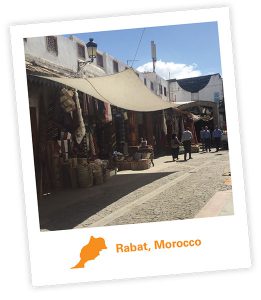 Language and cultural differences are the two most important things to adapt to when traveling to a different country.
Language and cultural differences are the two most important things to adapt to when traveling to a different country.
Prior to embarking on Remote Year, I had a grand plan to do a self-guided tour and iPhone photoshoot of home improvement stores in each country I visit. Turns out, that’s not as easy as it sounds.
The way things work in other countries is just, well, different. However, there was one aspect of the independent retailing channel that I’ve learned spans across borders—superior customer service.
Lisbon, Portugal
After an hour of Google searching for independent hardware stores in Lisbon, Portugal, I put on my walking shoes to visit two stores within a 30-minute walk of my apartment.
When I arrived at store No. 1, I was quickly disappointed when I realized that it wasn’t open, despite the hours listed online. Lesson one: You can’t always trust the internet when it comes to information on small Portuguese businesses.
So, I walked another 20 minutes to check out another hardware store.
In Portugal, many people spoke English, so I confidently walked into the small store and asked the elderly gentleman at the counter if he was the owner. With a questioning look on his face, he began to speak in Portuguese and motioned for his wife, who also worked in the store, to come over.
I realized quickly that they didn’t speak any English. So, I did my best to use makeshift sign language to ask if I could look around and take
a few photos.
This “conversation” ended in the store owner going back and forth to the back room attempting to find the product or products he thought I was asking for. After he tried several times to bring me a product, and I tried repeatedly to explain that I simply wanted to take a few pictures, the visit ended with the owners drawing me a map to the nearest camera store.
As I exited the store, I felt discouraged by my lack of success in getting photos to share with retailers back home. But, even more so, I also felt overwhelmingly touched. It would have been easy for these store owners to shoo me away from their store. Instead, they took nearly 30 minutes out of their busy day and diligently tried to help me find what I was looking for, despite the language barrier. They refused to let me leave their store without providing me an answer to the question they thought I was asking.
I take pride in my work for NRHA because I believe so greatly in the power of the independent industry and what a strong role independent business owners play in the lives of their customers and communities. It was amazing to see the personalities of the local businesses I know and love back home, echoed across the world.
Rabat, Morocco
In Rabat, Morocco, most of the locals did their shopping at the “Medina of Rabat,” which we referred to as “the Medina” for short.
To read the continuation of this post, visit TheRedT.com/portugal-morocco.
Learning From Each Other, Regardless of Where We’re From
Upon arriving in a new place, I could always count on discovering a retail quirk unique to that specific city
or country.
The longer I stayed in each location, the more I understood how retail practices unfamiliar to me were so well suited for their communities, and how certain lessons from these businesses could be applied to North American stores.
Small Stores, Big Business
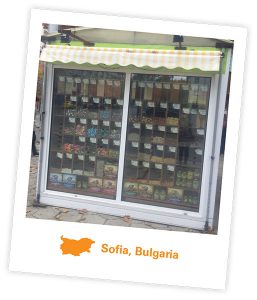 “Oh, that bag of chips looks good. I think I’m in the mood for something salty. Maybe I should grab a water bottle, too.”
“Oh, that bag of chips looks good. I think I’m in the mood for something salty. Maybe I should grab a water bottle, too.”
If you’re doing impulse right, these are the same thoughts running through your customers’ minds while they’re waiting in line at the checkout counter of your store.
In Sofia, Bulgaria, there are businesses that thrive on consumer impulses. These types of shops sell snacks, soda, alcohol, water and cigarettes, and exist at busy intersections and on popular streets throughout the city as freestanding booths, among a row of retail establishments or underground with a small, drive-thru-like window facing the street.
During my five-week stay in Sofia, I found myself at these little shops on more than one occasion. Once, I stopped to buy a snack on my way to a walking tour to hold me over until lunch because I thought I might get hungry. Another time, I was walking home from dinner with a friend who wanted a pack of cigarettes. And on yet another visit, I saw an interesting looking candy bar in the window and had to try it for myself.
As a consumer, these stores annoyed me because I’m not the kind of person who stops at a store for a candy bar. But as a professional in the independent retail industry, I was intrigued by the way these retailers had mastered the art of running a successful small business in a city hub and tapping into impulse buying habits.
They’re Conveniently Located
When someone approaches one of these stores, it’s because they see something they want. All of the products offered at the business are clearly shown either through window displays or photos labeled with prices on the exterior of the shop.
You can adopt this practice by keeping your window displays interesting. Maybe you display your top seasonal items to remind customers of things they may not realize they need.
They’re Quick, Dependable and Well-Organized
The customer experience at these shops is fast and painless. The customer approaches the counter and tells the employee working at the booth or shop exactly what they want. The worker grabs the item, then the customer pays cash and goes on their way in a matter of minutes.
To read the continuation of this post and to see additional photos of the Bulgarian shops, visit TheRedT.com/sofia.
Stumbling Upon an Amsterdam Hardware Store
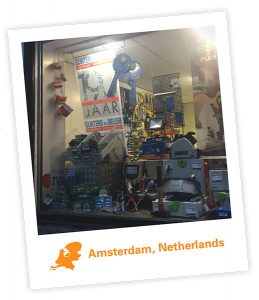 Because I work for NRHA, I can’t help but feel excited when I come across a local home improvement store in a foreign city.
Because I work for NRHA, I can’t help but feel excited when I come across a local home improvement store in a foreign city.
In November, my family met me in Amsterdam to celebrate Thanksgiving. As we hurriedly walked down the stone streets lining the city canals in a rush to our afternoon tour, I spotted a hardware store called Gunters & Meuser. Understanding my connection to hardware stores, my family patiently waited as I walked in and gave myself a tour.
While there are always staple departments and physical elements to every hardware store, the most exciting part is discovering what makes each unique.
Gunters & Meuser’s unmissable quirk was its cool window displays.
On each side of the store’s front door were large windows. In the right window was a display with antiques and hardware relics likely collected throughout the history of the business. Also in the window was a sign that read “190 Jaar,” or 190 years.
To read the continuation of this post, visit TheRedT.com/amsterdam.
Handmade Merchandisers in Portugal
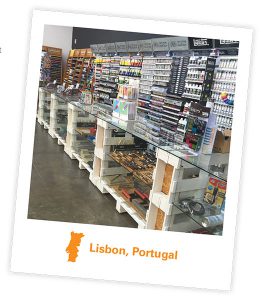 As my traveling companions and I roamed the stone streets of LxFactory, a historical industrial complex full of artsy retailers and restaurants in Lisbon, Portugal, our tour guide said, “Check out this art supply shop.”
As my traveling companions and I roamed the stone streets of LxFactory, a historical industrial complex full of artsy retailers and restaurants in Lisbon, Portugal, our tour guide said, “Check out this art supply shop.”
Upon walking into the shop called Ponto das Artes, my eyes bounced around the room—paints, papers, easels, adhesives. I’m assuming this store would be any artist’s dream. But what truly captured my attention were the beautifully handmade wooden merchandisers displaying products within the modern space.
Unfortunately, I do not speak Portuguese so there was a communication barrier between the salesclerk and me. However, with a little bit of makeshift sign language and Google Translate, I did manage to confirm that all displays were handmade by someone associated with the store.
Wood Pallets Turned Mobile Displays
In the center of the store stood two displays made of painted wood pallets with wheels.
For read the continuation of this post and to see photos, visit TheRedT.com/portugal.
Store Visits in Europe: Takeaways From Leading Hardware Retailers
One really wonderful aspect of NRHA is that our executive leadership team is connected to the home improvement industry on an international level. While in Europe, I was able to connect with a few of NRHA’s friends to learn about what the industry is like on the other side of the pond. In January, I traveled to Stockholm, Sweden, and Aix-en-Provence, France, to meet with store owners and industry professionals.
Innovative Thinking at Quincaillerie Aixoise
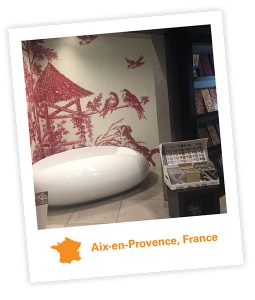 What does it take to be the largest, most successful retailer in Southern France? I visited Quincaillerie Aixoise to find out.
What does it take to be the largest, most successful retailer in Southern France? I visited Quincaillerie Aixoise to find out.
Quincaillerie Aixoise is a multistore operation headquartered in Aix-en-Provence, France, with five locations in Aix-en-Provence and the surrounding cities. The company’s primary clientele are professionals, with the occasional walk-in DIY customer.
Owner and CEO Jean-Francois Dubost has grown the company from a one-store to a five-store operation and has achieved great success in his 20 years in the business. In that time, he’s also increased total sales from approximately $7 million to more than $36 million. He keeps his business ahead of the curve with his creativity, leadership and eye for business opportunities.
I toured four Quincaillerie Aixoise locations during my visit and saw elements in each that stood out as contributors to the company’s success.
Well-Executed Store-Within-a-Store Concept
Inside the main 53,000-square-foot store, customers shopping for new drawer knobs, a drill and work boots will have a completely unique experience in each department. Dubost has made it a point to give several departments within the store a defined space with a unique store-within-a-store concept. Customers may
feel as if they’re in a jewelry store while picking out a new door handle. As they walk into the next section of the store, they find several spaces dedicated to different power and hand tool brands. Look further, and they find themselves in what feels like a clothing and shoe boutique, complete with dressing rooms.
The neat aspect about the store-within-a-store concept at Quincaillerie Aixose is that it makes wandering through the business fun for customers. Instead of walking down a few aisles to find the next item on the list, customers walk through a series of differently designed and merchandised rooms throughout their shopping experience.
Is there a way you could improve customers’ experiences through new merchandising or layout improvements?
Filling a Hole in the Market With Textiles
In addition to offering the main categories available in most hardware stores, Dubost recently started offering a unique niche: textiles. Dubost worked with several clients in the restaurant and health care industries and realized that he could become their main supplier for uniforms and workwear in addition to providing them with their hardware and building materials. He quickly became the No. 1 seller of textiles in the area and continues to hold that distinction. The operation offers a range of technical services to building professionals and local petrochemical and steel companies. Additionally, Dubost sells textiles to health care clients including hospitals, clinics and doctors’ and dentists’ offices. Other clients include hotels, restaurants and chefs.
How do you fulfill your customers’ unique needs?
To read the continuation of this post and see photos, visit TheRedT.com/france.
Lessons From Swedish Retailers
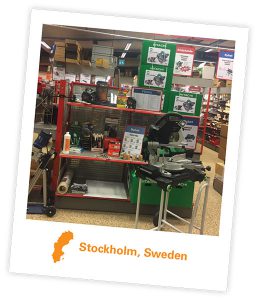 When I was living in Valencia, Spain, with Remote Year, I visited Byggmaterialhandlarna, the association serving the home improvement industry in Sweden.
When I was living in Valencia, Spain, with Remote Year, I visited Byggmaterialhandlarna, the association serving the home improvement industry in Sweden.
During my time in Sweden, Göran Sundström, former retailer and president of the Swedish Hardware Heritage Association, showed me around several independent hardware stores, each with something different to share.
Store Signage at XL-BYGG
XL-BYGG has nearly 100 store locations across Sweden that cater to professional and DIY customers. In addition to a wide range of products, XL-BYGG offers many services, and the company makes sure customers are aware of what it sells. In the front foyer of the Vasteras, Sweden, store, customers see a floor-to-ceiling list of the services offered. As soon as they walk in, customers know exactly what the store offers that big-box retailers may not.
Does your store offer services that your customers need to know about? Use simple, clear signage to let them know.
New Products Display at Flinks Jarn
Flinks Jarn is a business-to-business home improvement company with five store locations throughout Sweden. The location I visited maintains a display in the center of the salesfloor featuring the latest items so customers always know what’s new. This display is consistently updated, and customers know to look there for current and interesting products.
Are customers missing out on what’s new in your store? Consider dedicating an endcap or some easy-to-find shelf space to new products.
Extra Parks at Fredells Byggvaruhus
In business since 1903, Fredells is an independent retail giant that provides its customers with building materials and construction services. Fredells knows that when customers are in the store for an extended amount of time, it’s important to make them feel as comfortable as possible.
In order to do that, the company offers a kids’ corner with games, toys and a television.
While you may not have the space to dedicate an entire room, you can offer entertainment for youngsters in other ways by providing coloring books or games.
Fredells takes an extra step to please customers by offering an in-store restaurant. This allows customers to relax and grab a bite after shopping, and it also encourages restaurant patrons to explore the store after their meals.
While opening a restaurant may not be feasible for most retailers, all store owners can make customers’ experiences a little more comfortable by offering snacks, such as popcorn, or beverages like coffee and water.
To see additional photos of Swedish independent hardware stores, visit TheRedT.com/sweden.
 Hardware Retailing The Industry's Source for Insights and Information
Hardware Retailing The Industry's Source for Insights and Information







